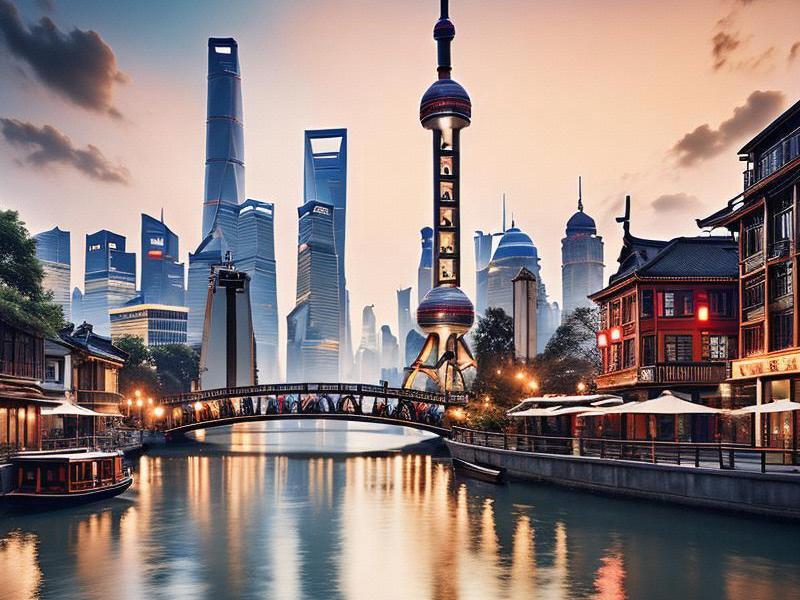This article delves into the captivating essence of Shanghai, exploring its rich history, vibrant culture, dynamic economy, and iconic architecture. Shanghai, a city that has witnessed the ebb and flow of centuries, stands today as a beacon of modernity and tradition in China.

Nestled along the eastern coast of China, Shanghai is the largest city in the country and one of the most influential global financial hubs. Its strategic location at the mouth of the Yangtze River has historically made it a key port for trade and commerce, attracting merchants and immigrants from all over the world.
The history of Shanghai is a tapestry woven with threads of both Chinese and international influences. In the 19th century, the city was forcibly opened to foreign trade following the First Opium War, leading to the establishment of the International Settlement and the French Concession. These areas, with their distinct European-style architecture, are a testament to the city's colonial past and its role as a melting pot of cultures.
One cannot discuss Shanghai without mentioning its remarkable cultural scene. The city is a hub for art, fashion, and cuisine. The Bund, a waterfront area lined with historic buildings, offers stunning views of the futuristic skyline of Pudong across the Huangpu River. Here, visitors can witness the juxtaposition of old and new, as traditional Chinese lanterns glow against the backdorpof gleaming skyscrapers.
Shanghai's cultural institutions are world-class, including the Shanghai Museum, which houses an impressive collection of ancient Chinese art, and the Shanghai Grand Theatre, a venue for opera, ballet, and symphony performances. The city also hosts numerous festivals throughout the year, such as the Shanghai International Film Festival and the Shanghai Fashion Week, attracting artists, designers, and cinephiles from around the globe.
爱上海同城对对碰交友论坛
The economy of Shanghai is a powerhouse, driving China's rapid development. As one of the four municipalities directly under the central government, Shanghai enjoys a high degree of autonomy and is a major center for finance, trade, and manufacturing. The city's Lujiazui Financial District is home to the headquarters of many of China's largest banks and multinational corporations, making it a critical player in the global economy.
In recent years, Shanghai has also emerged as a leader in innovation and technology. The Zhangjiang Hi-Tech Park is a hub for research and development, fostering the growth of the city's high-tech industries. Additionally, Shanghai's free trade zones have attracted foreign investment and facilitated the import and export of goods, further solidifying its position as a global trade center.
Architecture in Shanghai is a visual feast, reflecting the city's diverse history and rapid modernization. The classic Shikumen style, characterized by stone gateways and intricate wood carvings, can still be found in areas like Tianzifang, a charming neighborhood that has been transformed into a trendy arts and crafts enclave. On the other hand, the futuristic skyline of Pudong, with its iconic landmarks such as the Oriental Pearl Tower, the Jin Mao Tower, and the Shanghai Tower, showcases Shanghai's ambition and progress.
上海龙凤阿拉后花园
The Shanghai Tower, the tallest building in China and the second-tallest in the world, stands at 632 meters and features a unique twisting design. It is not only a marvel of engineering but also a symbol of Shanghai's aspirations to be a global leader in innovation and design. The tower houses offices, a luxury hotel, and an observation deck offering breathtaking views of the city.
Shanghai's transportation system is another aspect that highlights its modernity and efficiency. The city boasts one of the most extensive metro networks in the world, providing convenient and affordable access to all parts of the city. Additionally, the Maglev train, which connects Pudong International Airport to the city center, is the fastest commercial train in the world, traveling at speeds of up to 430 kilometers per hour.
The city's commitment to sustainability is evident in its efforts to reduce pollution and promote green spaces. The Huangpu River, once heavily polluted, has undergone significant cleanup efforts, and the city has developed numerous parks and green belts, such as Century Park and Zhongshan Park, providing residents and visitors with places to relax and enjoy nature.
上海花千坊龙凤
Shanghai's people are as dynamic and diverse as the city itself. With a population of over 24 million, Shanghai is a melting pot of different ethnicities and cultures. The city's residents are known for their entrepreneurial spirit, adaptability, and cosmopolitan outlook. This vibrant mix of people contributes to the city's unique character and energy.
Education is highly valued in Shanghai, and the city is home to some of the best universities in China, including Fudan University and Tongji University. These institutions attract students from all over the country and the world, fostering a culture of learning and innovation.
In conclusion, Shanghai is a fascinating metropolis that seamlessly blends its rich history with cutting-edge modernity. Its cultural vibrancy, economic prowess, architectural marvels, and efficient infrastructure make it a city that captivates the imagination of visitors and residents alike. As Shanghai continues to grow and evolve, it remains a symbol of China's rise as a global power and a testament to the enduring spirit of its people.
Whether you are strolling along the Bund, exploring the art galleries of Tianzifang, or enjoying the views from the Shanghai Tower, one thing is certain: Shanghai is a city that leaves a lasting impression on all who visit.